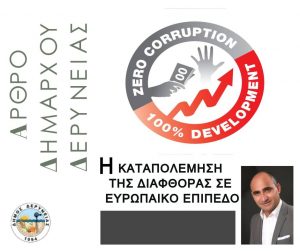
The European Parliament's Research Service has recently published a very interesting study on the corruption phenomena that plague the European Union. Widespread corruption severely affects economic growth and undermines democracy, social justice and the rule of law, as demonstrated by the European Commission's report to the European Council and Parliament on the fight against corruption.
Stability, cooperation, as well as the fight against corruption, are the key political priorities of the European Commission of the Regions' current term. Undoubtedly, corruption affects institutions and alienates citizens from the European Union, which is trying, through local and regional authorities, to recover and regain citizens' trust.
Estimates from the European Parliament's Research Service show that corruption costs the European Commission between € 179 billion and € 990 billion a year. Eurobarometer surveys highlight the existence of corruption, not only in citizens or governments but also in all social strata, thus significantly affecting business activity.
Also of concern to the European Union are forms of corruption in the enlargement countries, and especially in the Western Balkans and the countries of the South Caucasus, such as favoritism, conflict of interest, nepotism, abuse of power, transparency and protection of whistle-blowers.
The majority of Europeans believe that democracy and the abuse of power for personal gain are widespread in local or regional public bodies, political parties and politicians, at national, regional or local level. After all, the fight against corruption is one of the main concerns of citizens, as it affects the equitable distribution of public resources, having a negative impact on investment, economic growth, job creation, social welfare, education, service contracts , in the Structural Development Funds etc.
Citizens, businesses and non-governmental organizations agree on the tragic dimensions of corruption and its consequences. So, in the face of the adverse effects of corruption at the social level and in the face of the findings of the studies, which demonstrate the seriousness of the problem, the elected officials are called upon by their actions, actions and exemplary leadership, to prove that they are ready. fight corruption at local and regional level.
The fight against corruption in all its forms, as well as coordinated preventive action and its fight should be primary goals for local authorities. An important role in the effort of local authorities to fight corruption is played by those who report such incidents and who should be protected in secret, as they contribute greatly to the prevention, detection and reporting of irregularities and the detection and publication of corruption cases.
The recent publication of the "Panama Papers" highlights the importance of free media, investigative journalism and allegations of money laundering. Unfortunately, the absence of a civil protection system reporting allegations of corruption and loopholes in legislation throughout the European Union do not facilitate citizens' cooperation in investigating and investigating suspected corruption.
Freedom, security and justice are the basic rights of European citizens, which are being violated by the lack and often inadequate control of corruption. The European Union needs a review of the criminal law of the Member States, a common policy and a package of measures to reduce, prevent, detect and combat corruption. It is precisely this catalytic intervention that every European citizen needs in order to keep Europe firmly at heart.
